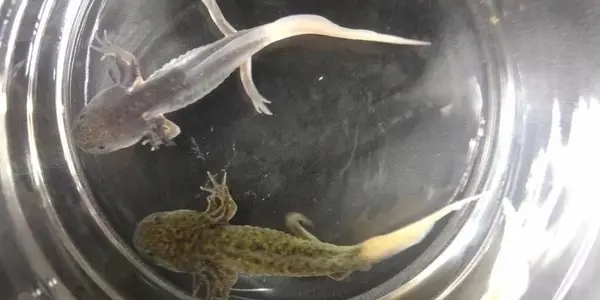Different Types / Morphs of Axolotls
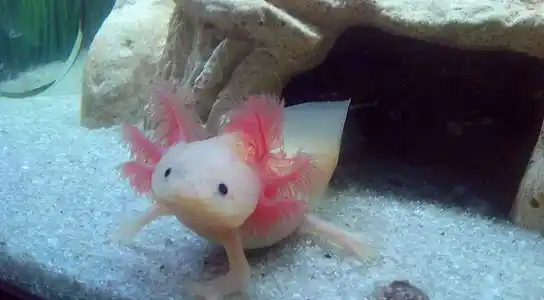
Leucistic
A leucistic axolotl is a unique and visually striking type of axolotl. They are predominantly white or pale pink in color. This appearance is due to leucism, a condition characterized by reduced pigmentation. Their eyes are usually black or dark-navy, which is one of the key features distinguishing them from albinos. They have feathery, external gills that are often bright red or pink due to the visibility of blood vessels beneath their translucent skin. These Axolotls may or may not develop freckles depending on the environment and genetics.
Wild Type
A Wild Type Axolotl, reflecting the natural coloration found in the species' native habitat, has distinct features. The primary color is a dark, mottled brown, often with shades of green, tan, or olive. This coloring provides camouflage in their natural environment. Often they contain speckles of shiny gold known as iridophore pigment. The eyes are usually dark with a metallic gold ring around the pupil, which differentiates them from leucistic, melanoids, or albino axolotls. The external gills are typically the same dark color as the body or slightly lighter, with feathery tips that can be red or pink, indicating blood flow.
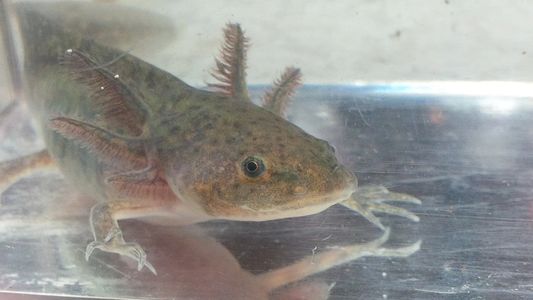
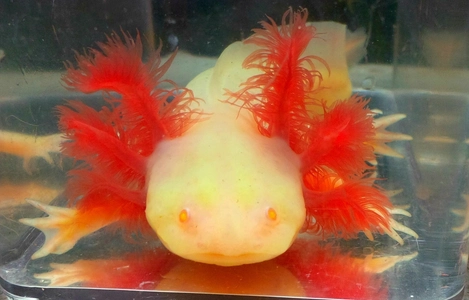
White Albino
A White Albino Axolotl is a fascinating and distinctive variety of axolotl, characterized by its unique coloration and features due to albinism. They are predominantly white or very pale pink. This appearance is due to albinism, a genetic condition that results in a lack of melanin, the pigment that normally provides color to the skin. One of the most notable features of an albino axolotl is its eyes, which are usually red or clear. This is because the lack of pigment in the iris allows the blood vessels of the retina to be visible. The gills are often the same pale color as the body, with feathery, bright red or pink filaments due to the visibility of blood vessels under their translucent skin. The white albino comes in two forms, known only as white and xanthic; for simplicity, we will just call them white albinos.
Golden Albino
A Golden Albino Axolotl is a captivating variant of the axolotl, known for its distinctive and attractive appearance. The Golden Albino Axolotl exhibits a luminous golden-yellow to light tan color. The golden coloration is due to the presence of yellow pigments, combined with the absence of darker pigments typically inhibited by albinism. Like other albino creatures, Golden Albino Axolotls have characteristic red or clear. The lack of pigment in the iris means the blood vessels in the retina are visible, giving the eyes their distinctive coloration. Their gills are usually a matching golden or pinkish hue, with feathery gill stalks that may be tipped with a brighter color, often appearing reddish or peachy due to the blood vessels.
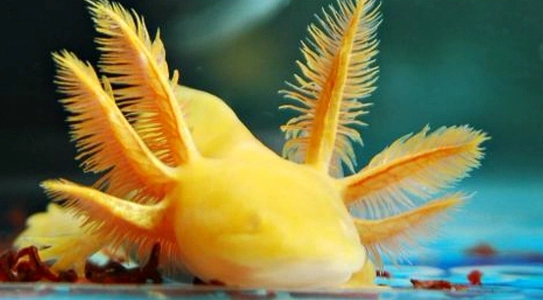
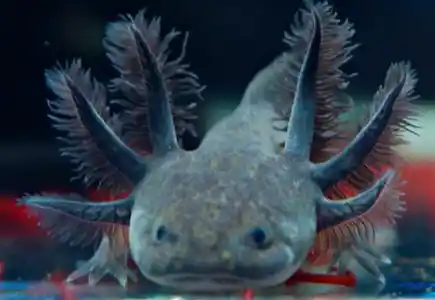
Melanoid
A Melanoid Axolotl is a unique morph of the axolotl, distinguishable by its specific pigmentation characteristics. Melanoid Axolotls are characterized by their dark, uniform coloration. Unlike Wild Type axolotls, Melanoids lack iridophores, the cells responsible for reflective pigments. As a result, their color appears matte and is typically a solid black or very dark gray, without the shiny or speckled appearance seen in other axolotl morphs. Their eyes are generally black or very dark, lacking the shiny gold ring around the pupil present in Wild Type axolotls. The gills of Melanoid Axolotls are typically the same dark color as their body, with the feathery filaments often appearing more subdued compared to other brighter colored morphs. This is a simply black Axolotl.
GFP Axolotls
GFP stands for Green Fluorescent Protein, which is a remarkable variant of axolotl that has been genetically modified to express a fluorescent protein, giving them a unique appearance under certain lighting conditions. This genetic trait is passed down from generation to generation and can be bred into any morph of Axolotls. Under normal lighting, GFP Axolotls can appear similar to other axolotl morphs and come in various colors such as wild type, leucistic, albino, or melanoid. The GFP gene doesn't typically affect their base coloration. The defining feature of GFP Axolotls is their ability to glow a bright green color when exposed to ultraviolet (UV) or blue light. Fun fact: This fluorescence is due to the expression of the Green Fluorescent Protein, originally derived from jellyfish. Their eyes and gills are similar to their base morph (for example, a GFP Leucistic would have dark eyes and pale gills), but the pupils will be emerald green & the gills may also exhibit some level of fluorescence under UV or blue light.
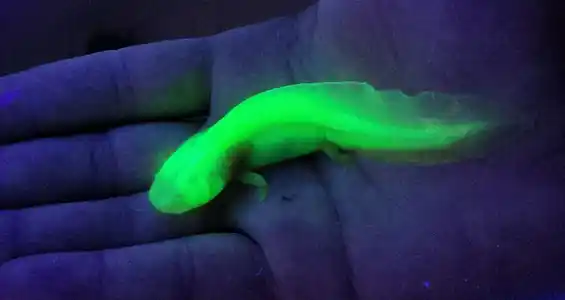
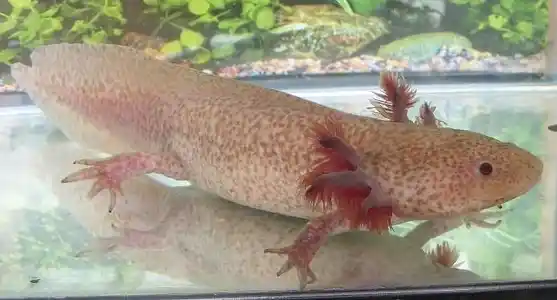
Copper
A Copper Axolotl is a distinct and visually striking morph of the axolotl, known for its unique coloration. Copper is a variety of albinism, as they have red-tinted eyes and lay white eggs. The Copper Axolotl exhibits a copper or light brownish-orange color, which can range from pale to more intense shades. The copper color is due to a specific genetic mutation affecting pigmentation. The gills of Copper Axolotls are often the same color as their body or slightly lighter. The gill filaments are feathery and may have a pinkish hue due to visible blood vessels.
Chimera
A Chimera Axolotl is an extremely rare and fascinating morph, resulting from a unique genetic event. Here's what a Chimera Axolotl typically looks like. The most striking feature of a Chimera Axolotl is its bilateral symmetry in coloration. This means that one side of its body can be a completely different color from the other side. For example, one side might be white (like a leucistic morph) while the other side is black (like a melanoid morph). Chimerism in Axolotls is said to be when two eggs fuse together during embryonic development, and each side grows according to the egg it originated from, often resulting in a split-down-the-middle appearance; However sometimes if the two eggs fusin together are the same morph you may never even notice it. One side can often grow at a slightly slower rate than the other. The eyes and gills of a Chimera Axolotl can also reflect this dual coloration, with each side potentially exhibiting characteristics of different morphs.
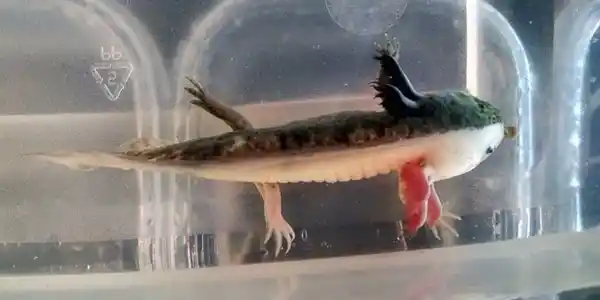
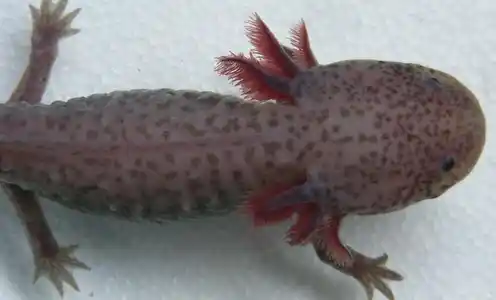
Silver Dalmatian / Lavender
A Silver Dalmatian, also known as a Lavender Axolotl, is a particularly striking morph characterized by its unique coloration and patterning. The primary color of a Silver Dalmatian/Lavender Axolotl is usually a pale, silvery lavender. This unique color gives the morph its name and is a result of a specific combination of genetic traits. True to the "Dalmatian" name, these axolotls are known for their dark spots or speckles. These markings can vary in size and density but are typically black or dark gray, providing a stark contrast to the lighter base color. The eyes of a Silver Dalmatian/Lavender Axolotl are usually dark, which contrasts with the lighter color of their body. Their gills are often the same color as their body, with feathery filaments that may be tipped in a darker color. The gills can appear particularly striking against the pale background of the axolotl's body.
Enigma
The Enigma Axolotl displays a mix of different colors and patterns across its body. Unlike other axolotl morphs with more consistent coloration, Enigmas can have a variety of colors including black, white, gold, grey, and even patches of other colors. The patterning on an Enigma Axolotl is typically irregular and can include spots, patches, stripes, or other markings. The pattern is usually random and varies greatly from one individual to another, making each Enigma Axolotl unique. The eyes of an Enigma Axolotl may match the coloration of the surrounding skin or have a distinct color of their own. The gills often reflect the diverse coloration of the body. They are feathery and can be multi-colored, which adds to their striking appearance.
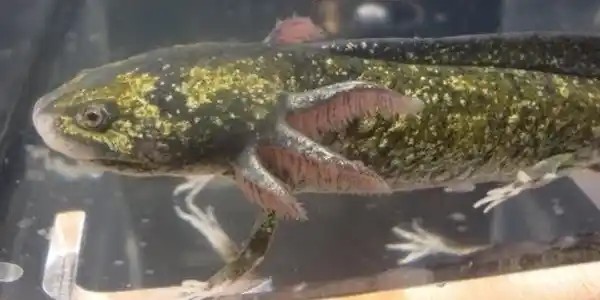
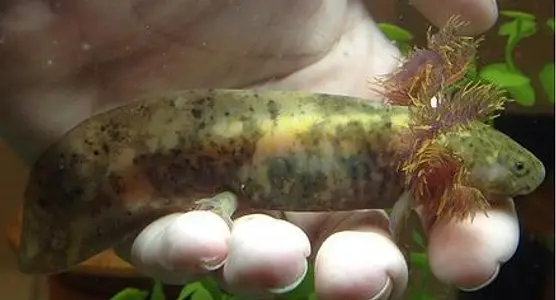
Mosaic
The mosaic pattern in axolotls is the result of chimerism or genetic mosaicism, where an individual is composed of cells with different genetic makeups. This can occur naturally or be induced in a laboratory setting. The most striking feature of a Mosaic Axolotl is its varied coloration. Unlike other axolotl morphs with more uniform colors, mosaics display a mix of different colors and patterns across their bodies. This can include patches of black, white, gold, and other colors. Mosaic Axolotls have irregular and random patterns, much like the tiles in a mosaic artwork. These patterns are unique to each individual and can include spots, patches, and other markings in various colors. The eyes of a Mosaic Axolotl can also reflect this diversity in coloration, often matching the coloration of the surrounding skin or displaying a unique color themselves. The gills often exhibit the same diverse coloration as the body, with feathery filaments that can be multi-colored, adding to their striking appearance.
Piebald
The defining feature of a Piebald Axolotl is its irregular pattern of pigmentation. This morph typically displays large patches of unpigmented areas, usually white or pink, mixed with pigmented sections. The pigmented areas can be of various colors, such as black, grey, or even golden, depending on the axolotl's genetic makeup. The pigmentation in Piebald Axolotls is randomly distributed, resulting in a pattern that is unique to each individual. The unpigmented areas lack melanin, giving them a pale appearance, while the pigmented sections may appear in stark contrast. Piebald Axolotls have pigmentation that goes down the body and sides. Many heavily-spotted leucistic is mistaken for piebald. The axolotl in the picture does not have much side pigmentation, but it wouldn't be unusual for it to go all down the sides. A piebald is normally significantly darker, and thicker in black spots than a spotty-leucistic.
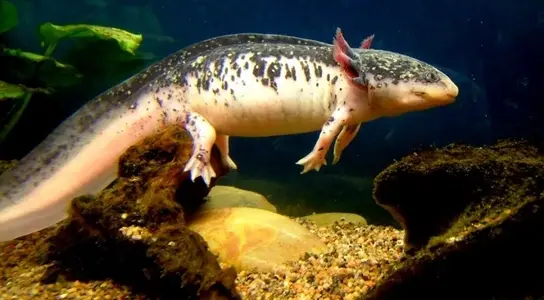
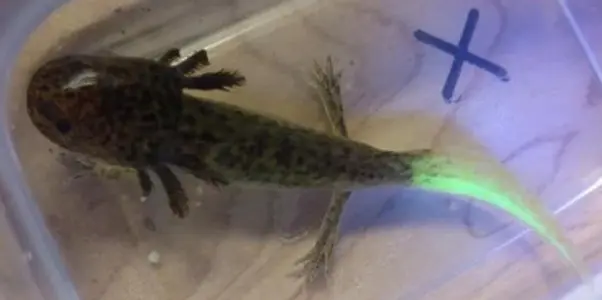
FireFly
FireFly Axolotls are literally one of a kind. These Axolotls were produced by Lloyd Strohl II from Indiana USA in 2016. These Axolotls are produced by embryonic graphing. The reason for these Axolotls being produced is because Lloyd Strohl II is conducting a preliminary investigation into the distribution and activation of melanocytes in leucistic Axolotls and, in particular, in mosaics Axolotls. The Firefly Axolotl is characterized by a dramatic contrast in coloration, typically with a dark or black head and upper body, and a bright fluorescent green tail. This stark contrast in colors resembles the appearance of a firefly, hence the name. The fluorescent green part of the Firefly Axolotl is designed to mimic bioluminescence, although it does not actually glow in the dark. This effect is usually achieved through the incorporation of GFP (Green Fluorescent Protein) genes, often seen in GFP Axolotls. Due to the way they are created, Firefly Axolotls are quite rare and are more of a novelty within the axolotl community.
